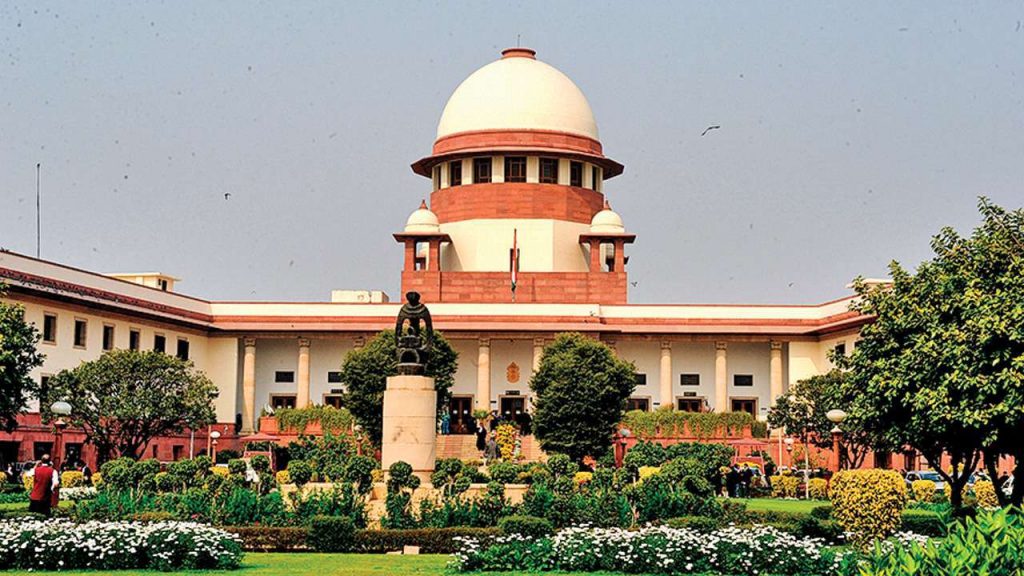New Delhi: The Supreme Court has dismissed a plea of a married daughter seeking a compassionate appointment in the place of her deceased father without the approval of the surviving mother.
A bench of Justices Ajay Rastogi and CT Ravi Kumar said that Rule 2.2 of Madhya Pradesh Police (Non-Gazetted) Service Rules of 1997 clearly indicates that name has to be sponsored by the deceased Government employee or the survivor parent.
“Rule 2.2 of the scheme clearly indicates that the name has to be sponsored by him/her, the deceased Government employee. Indisputedly, in the instant case the name of the petitioner has not been sponsored by her mother for the reasons best known to her. The question which has been raised by the petitioner is answered by rule 2.2 of the scheme of rules, needs no further consideration by this Court. Accordingly, the Special Leave Petition stands dismissed”, the bench said in its recent order.
The bench noted the submission of advocate Dushyant Parashar, appearing for the petitioner, that she happens to be the married daughter of the deceased Government servant, although has not been sponsored by the widow (petitioner’s mother), still, she has an independent right for being considered for compassionate appointment under the existing scheme of Rules.
Parashar said that the law is settled in the case in an earlier verdict of the top court that married daughters are entitled to compassionate appointments.
The bench said that it is alright, but in this case, Rule 2.2 does not support the petitioner.
Parashar said that the broader question is involved in view of the settled law, that “my brother is practising lawyer and I am the eldest sister and my mother has objected as I have filed property case seeking partition.”
Justice CT Ravi Kumar asked the counsel “What is the purpose of Compassionate Appointment? After four years of demise you have filed an application for the compassionate appointment”.
Justice Rastogi said that the problem is Rule 2.2 does not permit as it requires authorisation by the Survivor parent for grant of compassionate appointment to their son/daughter.
“Sorry, we are not inclined to interfere”, the bench said and passed the order.
Rule 2.2 of the Madhya Pradesh Police (Non-Gazetted) Service Rules states that a dependent husband/wife of the deceased government servant, if not being eligible or opting not to accept compassionate appointment by self, then the son or unmarried daughter nominated by him/her will be granted a compassionate appointment.
According to the plea filed by Parashar, an application was filed by the wife of the deceased government servant to give a compassionate appointment to her son.
However, the said application was dismissed on December 7, 2015, on the ground that the son of the deceased government servant cannot be granted compassionate appointment on the post of sub-inspector of Police as the post of Sub-Inspector is to be filled up as per the rules of 1997.
The plea said that thereafter an application was filed by the married daughter of the deceased government servant for grant of compassionate appointment, the said application was rejected on two grounds.
The first ground was that a compassionate appointment to the married daughter of the deceased government servant cannot be given as per a circular of the state government dated June 29, 2019.
The second ground was that the mother of the petitioner has not given consent to her married daughter to file an application for a grant of compassionate appointment.
“Further the mother of the petitioner has also raised an objection for giving appointment of her married daughter/petitioner and in such circumstances, the application for grant of compassionate appointment has been rejected by the competent authority”, the plea said.
Being aggrieved with the decision of the competent authority, the daughter approached the Madhya Pradesh High Court, which also dismissed her plea on the ground that her case for a compassionate appointment has been rejected as the same was objected to by the mother of the petitioner for grant of compassionate appointment.
PTI
